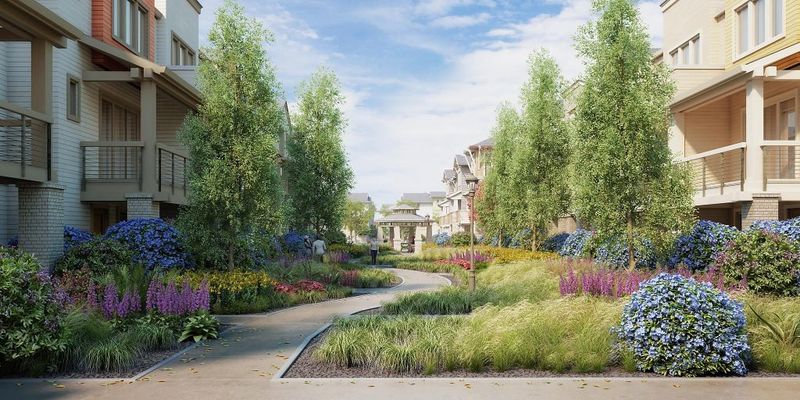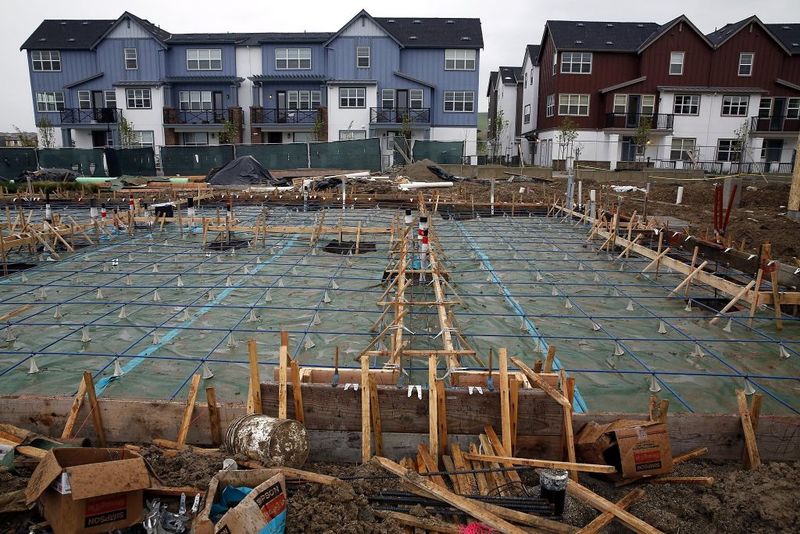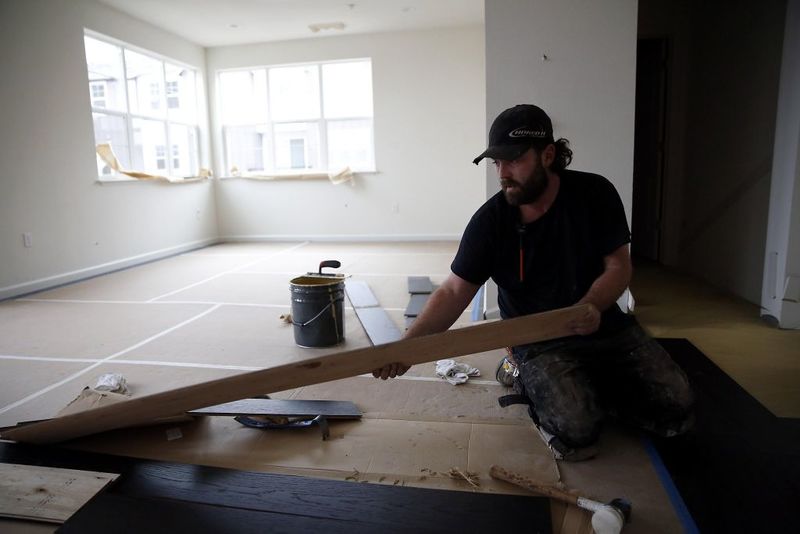Chinese developers muscling in to Bay Area housing market
The flood of Chinese money into Bay Area housing is coming not just from home buyers. Developers and investors are also building and backing large residential projects here. They mainly want to diversify away from China’s overbuilt market but also serve Chinese buyers wanting a home in the Bay Area.
The only U.S. metro area attracting more Chinese development dollars between 2013 and 2015 were New York and its boroughs, according to Jim Costello, a senior vice president with Real Capital Analytics.
Like all developers, they want large, liquid markets that offer a good return on investment. But they “they also look at the local Chinese American community,” Costello said. “Can they hire some local brokers with Chinese language skills who can go back and forth” between the U.S. and foreign partners “and even potentially Chinese buyers?”
The newest investment came in late February from Landsea Holdings, the U.S. subsidiary of one of China’s largest home builders. It paid $186 million for a 24-acre Sunnyvale site entitled for 450 townhomes. John Ho, Landsea’s CEO, estimated that up to 30 percent of the townhomes will be purchased by people from China.
The seller, Watt Cos., had purchased the former chipmaking campus for $60 million just over two years ago and got it entitled for three townhome villages called the Vale. Watt was planning to build one or two of the villages itself, but “we ended up getting an offer from Landsea that made it attractive ... to sell the whole project,” said Max Frank, a Watt division president. “Their appetite to grow their business in Northern California allowed them to get a bit more aggressive on their purchase.”
Unlike some Chinese developers, Landsea recruits its U.S. employees locally. “It has an experienced U.S. management team that understands home building in the U.S. and the culture,” Frank said.
This is Landsea’s seventh and biggest U.S. development. Based in Irvine, it is also building 109 townhomes at Kingswood in Dublin and a 30-unit complex in Walnut Creek.
Its parent company, Landsea Green Properties, builds homes mainly in Shanghai, Nanjing and other Yangtze River Delta cities. It began diversifying outside China in 2012. “We were doing really well as a company,” Ho said, but “our chairman had the foresight to see China’s market was going to soften.”
Chinese developers generally prefer permitted properties, said Darlene Chiu Bryant, executive director of ChinaSF, which promotes economic ties between the city and China. “They don’t understand the entitlement process. Some are willing to pay (up) for that, at least they know what they are getting.”
Milpitas towers
In Milpitas, a partnership headed by Singpoli Capital Corp. is developing a major project called Landmark Tower. It bought the 3-acre property in late 2014 when it was entitled for one 18-story tower with 375 condos and 150,000 square feet of office and retail space. It now plans to build two 22-story towers with 450 condos, but only 34,000 square feet of office and retail space. The Milpitas Planning Commission voted on Feb. 24 to recommend the new plan, which goes to the City Council April 5 for approval.
Singpoli began as a construction company in Hong Kong but is now based in Arcadia (Los Angeles County). Robert Ritner, Singpoli’s head of architecture and design services, said the company has domestic and foreign investors. In 2013, Hongye International Investment Group of Wuhai, China, invested $100 million in Singpoli to develop real estate construction in California and other projects.
Singpoli’s website says Landmark is a joint venture with Shanghai Bading Group. But Ritner said the developer is BDK Capital, which according to news reports is a joint venture between Singpoli and American BD. Kin Hui, Sinpoli’s CEO, did not return phone calls.
Singpoli also runs Invest LA, an EB-5 regional center program. These programs connect U.S. developers with foreign investors, these days mainly from China. The program awards green cards to foreign investors and their families who invest at least $500,000 or $1 million (depending on the location) in a business that directly or indirectly creates or preserves 10 U.S. jobs.
The first big Chinese investment in a Bay Area residential project was announced in February 2013. China Vanke invested $175 million for a 70 percent stake in Lumina, a 656-unit luxury condo project being developed by Tishman Speyer in San Francisco. Of the more than 400 units sold, about 80 percent went to Bay Area residents, 10 percent to Chinese buyers and 10 percent to other international buyers, a Tishman spokesman said.
In April 2013, Signature Development Group of Oakland said it had brought in Zarsion Holdings Group, a Beijing home builder, to co-develop the $1.5 billion mixed-use Brooklyn Basin. The 64-acre project on Oakland’s waterfront will have 3,100 residential units, 200,000 square feet of commercial space and 30 acres of parks and open space. Infrastructure construction is under way but the first apartments won’t be ready until mid-2018, with condos to follow, said Mike Ghielmetti, president of Signature.
Brooklyn Basin was Zarsion’s first investment outside China. “Their role is multifaceted,” Ghielmetti said. “They are using this to try and learn more about how development is done in the United States, which is vastly different than in China.”
In November 2014, Beijing’s Oceanwide Holdings Co. Ltd. struck a deal to buy a 1.2-acre site at First and Mission streets in San Francisco for $296 million from TMG Partners. The sellers reportedly had purchased the high-profile property in 2013 for $122 million.
The proposed project at 50 First St., now called Oceanwide Center, is primarily commercial but would also include 265 residential units. Encompassing two towers, it would add 1 million square feet of office space, 169 hotel rooms and 12,500 square feet of ground floor retail. It is scheduled to go the planning commission in May.
Oceanwide bought the property through its U.S. subsidiary Tohigh Property Investment. Tohigh also reportedly purchased a 186-acre undeveloped site known as La Campagna near Kenwood in Sonoma County.
Buying binge
R&F Properties, a Chinese real estate developer based in Guangzhou, has gone on a buying binge in the Bay Area since acquiring its first U.S. property, 555 Fulton St. in Hayes Valley. That project, with 139 condos, is scheduled for occupancy this year, according to Alan Mark, president of the Mark Co., which is marketing the units.
Mark said he went to Guangzhou with the head of his parent company, Pacific Union International, to “announce” the 555 Fulton project. But the focus of his marketing effort is the Bay Area. “There are enough buyers right here,” he said. The “preponderance” of foreign buyers have a child or other relative in the Bay Area, often one who is in school or recently graduated. The main reason Chinese developers are increasing their activity here is for diversification, he added.
R&F is developing other condo projects in San Francisco, Mark said, including 325 Fremont (approved for 118 units) and 119 Seventh Street (39 units). In downtown San Jose, it is developing Silvery Towers, a major product with 643 condos in two towers.
Asked if there is any chance the Bay Area could become oversupplied with new housing, Mark said not anytime soon.
“It is so difficult to get entitlements in California, he said. “We have only 666 new condos on the market (in San Francisco). In 2007-08, we had 3,000. Over the last half-dozen years we have ranged from 20 to 100 to closer to 1,000. I really believe we will not have more than 1,500 in any given year into the end of the decade. Buildings that are 40 stories or higher take 2½ to 3 years to build.”
Mentions
States
- California
Videos





Subscribe for News
Site Digest
Join Professionals on EB5Projects.com →
Securities Disclaimer
This website is for informational purposes only and does not constitute an offer or solicitation to sell shares or securities. Any such offer or solicitation will be made only by means of an investment's confidential Offering Memorandum and in accordance with the terms of all applicable securities and other laws. This website does not constitute or form part of, and should not be construed as, any offer for sale or subscription of, or any invitation to offer to buy or subscribe for, any securities, nor should it or any part of it form the basis of, or be relied on in any connection with, any contract or commitment whatsoever. EB5Projects.com LLC and its affiliates expressly disclaim any and all responsibility for any direct or consequential loss or damage of any kind whatsoever arising directly or indirectly from: (i) reliance on any information contained in the website, (ii) any error, omission or inaccuracy in any such information or (iii) any action resulting therefrom.







